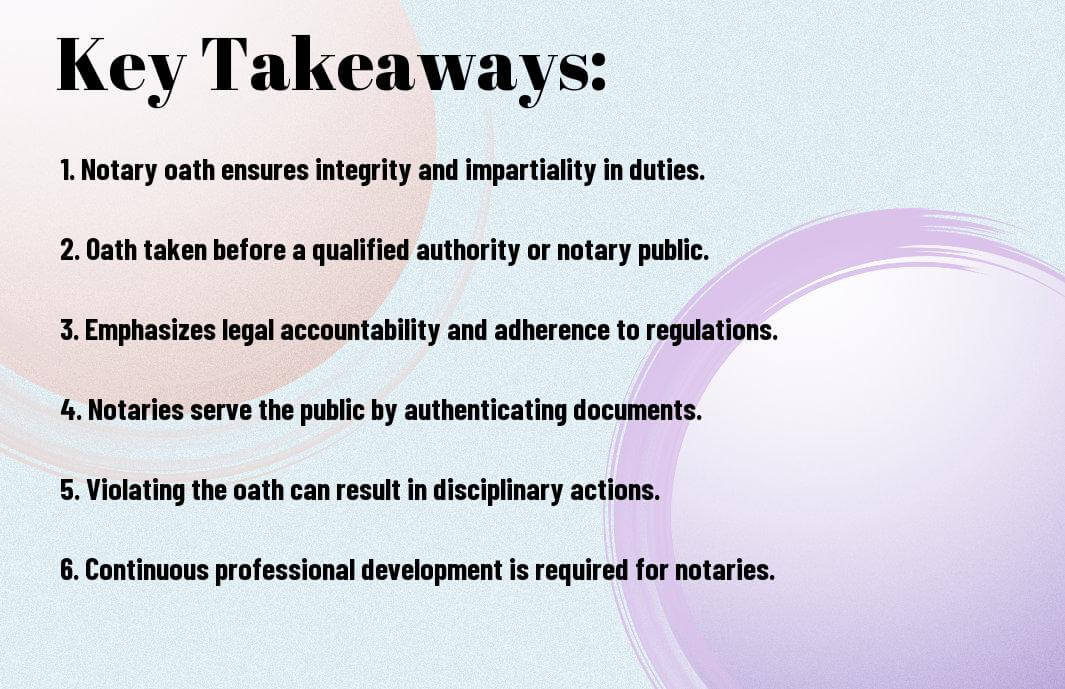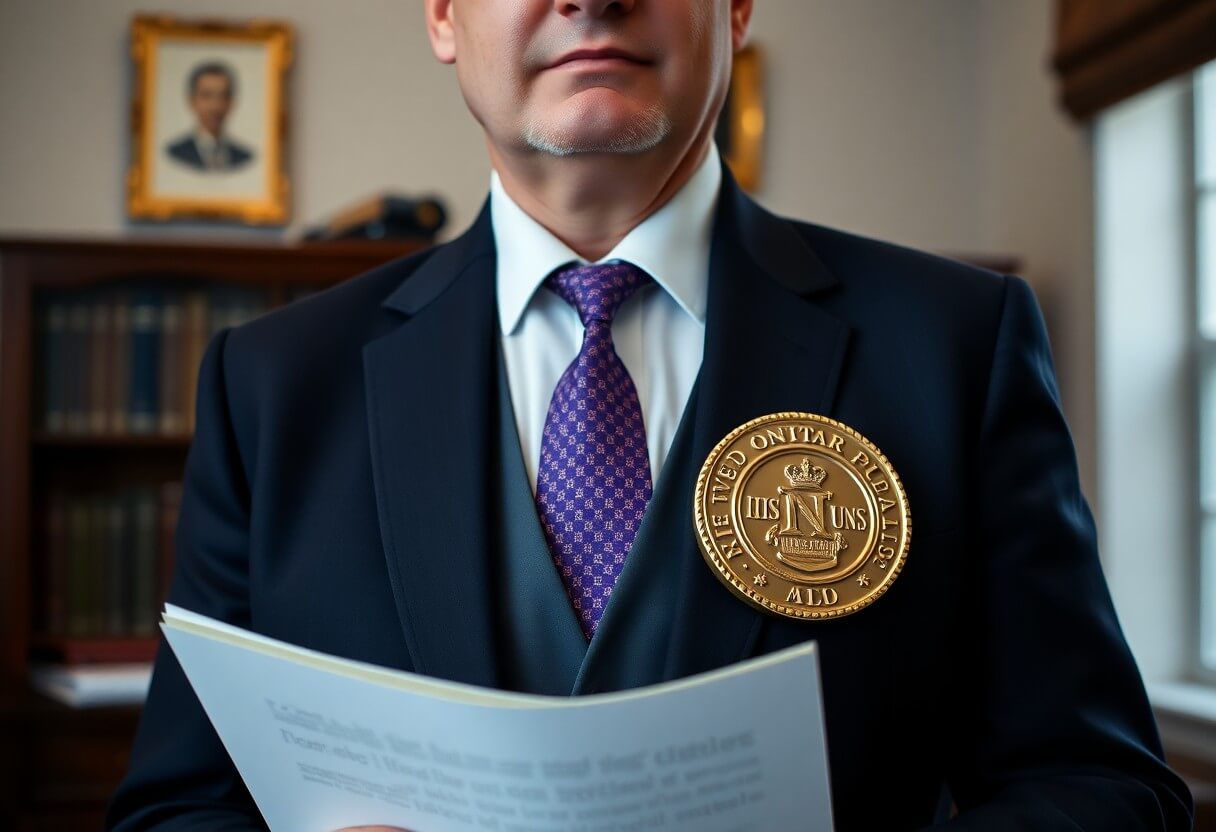Many of you may be curious about the significance of the Notary Oath in the UK, as it plays an important role in the responsibilities of a notary public. This oath serves as a commitment to uphold ethics and integrity while executing notarial acts, ensuring that you receive reliable and trustworthy services. If you want to explore deeper into this topic, check out our article on What is the Function of a Notary Public in the UK? to expand your understanding further.
Key Takeaways:
- Notary Oath: The Notary Oath is an vital declaration that a notary public must take to uphold their responsibilities with honesty and integrity.
- Legal Authority: This oath grants notaries the legal authority to perform various duties such as witnessing signatures and authenticating documents.
- Professional Conduct: Taking the oath ensures that notaries adhere to high standards of professional conduct, fostering trust in their services.
- Compliance: Notaries are required to comply with the rules and regulations set forth by governing bodies to maintain their commissioned status.
- Public Trust: The oath emphasizes the importance of public trust in the notarial process, promoting accountability and ethical behavior.
The Role of Notaries in the UK
To understand the vital function of notaries in the UK, you should know that they serve as impartial witnesses in legal matters, ensuring the authenticity of documents. Notaries play a critical role in verifying identities, administering oaths, and overseeing important transactions, especially when dealing with international legal matters. Their work helps you navigate complex legal landscapes, providing assurance and security in your dealings.
Historical Context
By exploring the historical context of notaries in the UK, you can appreciate the evolution of their role, dating back to ancient Rome. Originally serving as scribes and record-keepers, notaries have developed into key figures in legal transactions, adapting to changing laws and societal needs over centuries.
Functions and Responsibilities
Among the primary functions of notaries in the UK are the preparation, authentication, and certification of documents. They also handle matters such as powers of attorney, affidavits, and the execution of documents for use abroad, ensuring they comply with legal standards.
Consequently, notaries act as your trusted advisors, verifying the legality and validity of documents involved in various transactions. They are responsible for ensuring that all actions comply with the law, protecting your interests by preventing fraud. In addition to witnessing signatures, notaries may also provide legal advice and assistance in cross-border matters, which can be incredibly beneficial in an increasingly globalized world. Their expertise ensures the smooth execution of legal processes, allowing you to focus on your affairs with confidence.
The Notary Oath: An Overview
Clearly, the Notary Oath is a formal declaration that signifies your commitment to uphold the duties and responsibilities associated with your role as a notary public in the UK. By taking this oath, you affirm your dedication to providing impartial and accurate notarization services, thus ensuring the integrity of legal documents and transactions for those you serve.
Purpose and Significance
Beside establishing a foundation of trust, the Notary Oath serves to reinforce your accountability and ethical conduct as a notary public. This solemn commitment is vital for maintaining public confidence in the notarization process and ensuring that your actions are aligned with legal standards and professional guidelines.
Components of the Oath
Behind the Notary Oath lies a series of vital components that outline your responsibilities and ethical obligations as a notary public. These components often include affirmations of honesty, impartiality, and commitment to safeguard the interests of all parties involved in the notarization process.
This framework encapsulates the key tenets you must uphold, such as the obligation to act fairly and without bias, as well as to maintain confidentiality concerning the information you encounter. By articulating these principles, the request for loyalty to the law and your role in facilitating legal processes is clearly communicated. Each element of the oath not only emphasizes the significance of your role but also serves as a guide for maintaining professional integrity and ethical standards throughout your career.
The Process of Taking the Notary Oath
Despite the formal nature of the notarial process, taking the Notary Oath is designed to be straightforward. You will typically perform the oath in front of an official authority, such as a judge or another notary. This step solidifies your commitment to the responsibilities and ethical standards expected from you as a notary public.
Requirements for Notaries
Before you can take the Notary Oath, you must meet specific requirements. These include being over 18, possessing the requisite qualifications, and having a clear understanding of the notarial duties. Familiarizing yourself with these criteria is necessary to ensure a smooth process.
Steps Involved
Around the time you are ready to take the oath, there are several steps you must follow. These include gathering your documentation, confirming your eligibility, and scheduling an appointment with the relevant authority where you will take your oath.
Steps to take the Notary Oath include compiling necessary documents such as proof of identity and your qualifications. You will then need to find a suitable authority to administer the oath; this could be a qualified notary or a judge. Once your appointment is set, be prepared to affirm your commitment to uphold notarial duties and adhere to the legal standards governing your role. After taking the oath, you will be officially recognized as a notary public, allowing you to commence your practice.
Implications of the Notary Oath
Unlike many professions, the Notary Oath entails a significant level of responsibility and trust. As a notary, you must understand that the oath not only underpins your practice but also holds legal and ethical implications that can affect both you and your clients. Adhering to this oath is fundamental to maintaining the integrity of your role and the validity of the documents you notarize.
Ethical Obligations
Notary professionals are bound by a stringent set of ethical obligations that emerge from their oath. You are expected to act impartially and maintain confidentiality, ensuring that your services are accessible to all parties without bias. Upholding these ethical standards is crucial for fostering trust and integrity in your practice.
Legal Consequences
Beside the ethical expectations, there are strict legal consequences for failing to uphold your obligations as a notary. Violations can lead to disciplinary actions, including fines or suspension of your notary commission. In some cases, you may also face civil liability if your improper actions result in damages.
To understand the gravity of these legal consequences, you should recognize that any mistakes or misconduct can have far-reaching effects on your career. Poorly executed notarization, or failing to adhere to the proper processes, could compromise the legality of the documents you handle. Therefore, it’s vital to stay informed about the laws and regulations that govern your practice, as the penalties for violations could impact your professional reputation and financial stability.
Challenges Faced by Notaries
Now, as a notary, you encounter various challenges that can impact your daily responsibilities and the confidence of your clients. These difficulties range from administrative burdens and ethical dilemmas to adapting to evolving legal frameworks. Understanding these challenges is vital for your professional development and ensuring efficient service delivery.
Common Issues
Along your journey as a notary, you might encounter common issues such as high workloads and the necessity of remaining updated on legal requirements. These challenges can sometimes lead to oversights, which may have significant implications for the validity of your notarizations.
Regulatory Changes
For notaries, staying informed about regulatory changes is imperative to maintain compliance and protect your practice. The legal landscape surrounding notarial services can shift, requiring you to adapt quickly to new guidelines and requirements.
Understanding these regulatory changes allows you to enhance your practice effectively. By keeping abreast of updates from governing bodies, you ensure that your notarial acts are performed within the legal framework, safeguarding both your practice and your clients’ interests. Engaging in continuous professional development is an excellent way to stay informed, giving you the tools necessary to adjust to any upcoming legislative transformations.
Resources for Aspiring Notaries
Many individuals looking to become notaries in the UK can avail themselves of various resources that will aid in their journey. Understanding the core requirements, accessing training programs, and connecting with professional associations will provide you with the foundation and support needed for a successful career as a notary. Utilizing these resources will better prepare you for the responsibilities that lie ahead.
Training and Certification
Training is a vital component in becoming a certified notary. You will need to engage in a reputable training program, which usually covers the legal frameworks and practical skills required in notarial practice. Certification will usually follow your training, demonstrating your competency in fulfilling notarial duties.
Professional Associations
Training is further supported by professional associations that offer networking opportunities, resources, and guidance to notaries. Joining such associations can enhance your credibility and provide you with updated information relevant to your practice.
To successfully navigate your career, you should consider enrolling in organizations like the Notaries Society or the FNPN, which serve as platforms for continuing education, professional development, and community engagement. These associations often provide access to specialized training sessions, webinars, and mentorship programs that will enrich your understanding and skills in notarial work.
To wrap up
With this in mind, understanding the Notary Oath in the UK is vital for your role as a notary public. This solemn commitment underscores your dedication to honesty and integrity in executing your duties. By grasping the significance of the oath, you ensure that your practices align with legal standards and ethical expectations. Adhering to this oath not only enhances your professional credibility but also fosters trust with the clients you serve. Your commitment to upholding these values reflects positively on the entire notarial profession.
Q: What is the purpose of the Notary Oath in the UK?
A: The Notary Oath in the UK serves to uphold the ethical and professional standards required of a notary public. By taking the oath, notaries commit to performing their duties impartially and competently, ensuring the authenticity of legal documents and the accurate execution of legal procedures. This is vital in maintaining the trust of the public and legal institutions in the notarial process.
Q: Who is required to take the Notary Oath in the UK?
A: The Notary Oath must be taken by individuals who wish to practice as notaries public in the UK. This generally includes solicitors who have completed additional training specific to notarial work, and independent notaries who have undergone the necessary education and examinations. Only after completing this process and taking the oath can they officially act as a notary in legal matters.
Q: What are the consequences of not adhering to the Notary Oath?
A: Notaries who fail to adhere to the commitments made in the Notary Oath could face serious repercussions. This may include disciplinary actions by professional bodies, the loss of notarial status, and potential legal consequences for misconduct. Upholding the oath is important not only for the individual’s professional reputation but also for maintaining public confidence in the notarial system.





